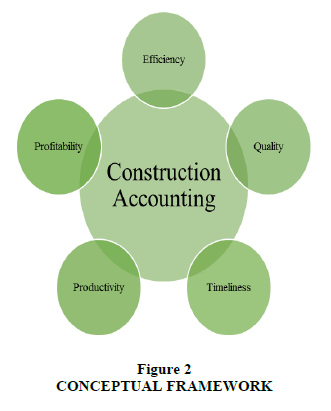Construction Accounting: A Guide to Properly Managing Costs and Financials
Construction Accounting: A Guide to Properly Managing Costs and Financials
Blog Article
Understanding the Significance of Building And Construction Accountancy for Effective Task Administration

Function of Building And Construction Accountancy
Construction accountancy acts as the foundation of financial administration in the building industry, making certain that jobs are finished within budget plan and financial objectives are met. construction accounting. This customized audit strategy addresses the distinct challenges dealt with in building jobs, including differing task durations, changing costs, and multiple stakeholders
One of the key roles of building and construction audit is to offer accurate expense estimate and monitoring throughout the job lifecycle. This facilitates informed decision-making, making it possible for project supervisors to adjust sources and timelines properly. Furthermore, building and construction bookkeeping enhances money flow administration by checking accounts receivable and payable, thus making sure that funds are readily available for timely repayments to providers and subcontractors.
It gears up task supervisors with the necessary economic data to prepare comprehensive economic declarations, which are vital for audits and financial reviews. Eventually, the function of construction audit extends past simple monetary monitoring; it is essential to critical planning and functional performance, driving the success of building and construction jobs in a competitive landscape.
Trick Components of Building And Construction Audit

Budgeting develops a monetary framework that guides task execution, permitting supervisors to allot resources successfully and prepare for prospective economic obstacles. Precise cost tracking is vital for tracking expenses in real-time, assisting to recognize variances in between predicted and actual expenses. This allows timely modifications to maintain the task on budget.
In addition, monetary coverage supplies stakeholders with a clear photo of the project's financial health. Regular reports, such as profit and loss statements and capital analyses, help with notified decision-making and boost transparency among all parties included.
Additionally, conformity with industry laws and bookkeeping standards is crucial. This guarantees that monetary practices are not just efficient yet additionally lawful, protecting the organization against lawful repercussions. By integrating these vital elements, construction accountancy cultivates a structured method to managing monetary sources, ultimately adding to the successful conclusion of construction projects.
Benefits for Project Supervisors
Leveraging efficient building bookkeeping practices gives task supervisors with a multitude of benefits that improve both functional effectiveness and financial oversight. One considerable benefit is improved budget administration. Accurate monitoring of expenditures and earnings enables project managers to monitor financial performance in genuine time, ensuring jobs remain within budget and assisting in prompt changes when needed.
Additionally, building audit improves cash flow management, making it possible for task supervisors to enhance and expect monetary demands source allocation. By understanding cash money inflows and outflows, they can better manage settlements to suppliers, subcontractors, and staff members, consequently avoiding costly delays.
Additionally, durable accounting systems provide extensive coverage capacities. Job supervisors can produce records that offer understandings into job success, cost variations, and resource usage. This data-driven strategy cultivates informed decision-making, permitting managers to identify possible concerns proactively and implement restorative steps.
Finally, adherence to building accountancy standards ensures compliance with regulatory and legal demands, reducing the threat of charges or disagreements. On the whole, reliable building and construction audit outfits job managers with the tools needed to drive job success, enhance stakeholder confidence, and promote lasting business growth.
Typical Obstacles in Building Bookkeeping
Lots of task supervisors come across substantial challenges in building and construction audit that can hinder project success. Among the primary obstacles is the complexity of tracking multiple task websites, each with distinctive spending plans, timelines, and source allotments. This calls for meticulous interest to detail, which can be frustrating without a robust audit system in location.
Furthermore, fluctuating product expenses and labor rates can complicate budget plan administration, making exact forecasting difficult. Task managers commonly struggle to resolve these prices with actual expenses, resulting in possible monetary disparities.
Moreover, building and construction bookkeeping entails compliance with numerous laws, consisting of tax obligation obligations and labor regulations. Browsing these policies can be complicated, especially for supervisors that might not have a solid accountancy background.
An additional significant challenge is handling cash circulation, which is crucial in the building and construction sector. Delays in invoicing, settlements from clients, or unexpected task changes can produce capital lacks, endangering the project's development.
Finally, efficient interaction in between task supervisors, accounting professionals, and area groups is vital. Misunderstandings can cause imprecise monetary reporting, even more complicating job administration initiatives. Dealing with these difficulties proactively is crucial for successful building and construction audit.

Finest Practices for Effective Audit
While navigating the complexities of building accountancy can be challenging, taking on finest techniques can considerably boost financial administration and task success. One basic Click Here practice is preserving timely and accurate documents. Carrying out durable accounting software application tailored to building jobs can enhance data entrance, invoicing, and reporting, saving and lowering errors time.
In addition, developing a clear budget and regular tracking against this spending plan are crucial. Utilizing a system of periodic financial testimonials allows job supervisors to determine variations early, assisting in prompt decision-making. It is likewise important to separate project prices right into indirect and straight categories, enabling clearer understandings right into productivity.
Another best technique entails promoting open interaction among all stakeholders. Normal updates and collaborative discussions concerning monetary condition can make certain every person is lined up and their website informed. Educating personnel in construction-specific bookkeeping principles additionally improves proficiency and precision.
Last but not least, making sure compliance with pertinent accounting standards and laws you could try this out is non-negotiable. Normal audits and inner testimonials add to openness and responsibility, constructing depend on with clients and stakeholders. By focusing on these ideal practices, construction firms can optimize their accountancy processes, eventually driving job success and monetary security.
Conclusion
Finally, building and construction audit plays a pivotal duty in ensuring successful project administration by promoting exact monetary oversight and boosting decision-making. By integrating key parts such as price estimation, cash money flow management, and compliance, job managers can navigate usual obstacles and take advantage of best practices for efficient accountancy. Inevitably, a durable building and construction accounting structure not just safeguards budget plan integrity but additionally adds to the overall financial health of building jobs, fostering lasting success within the industry.
By integrating these essential parts, building accountancy cultivates a structured strategy to managing financial sources, inevitably contributing to the effective completion of building and construction tasks.
Accurate monitoring of revenues and expenses enables project supervisors to monitor financial efficiency in actual time, ensuring tasks stay within budget plan and helping with timely changes when essential.
Job supervisors can generate reports that provide understandings right into task productivity, cost differences, and resource application.Many task managers experience substantial obstacles in building accounting that can prevent project success. construction accounting. Eventually, a robust building and construction bookkeeping framework not just safeguards spending plan honesty yet additionally adds to the total economic health and wellness of building and construction jobs, fostering sustainable success within the industry
Report this page